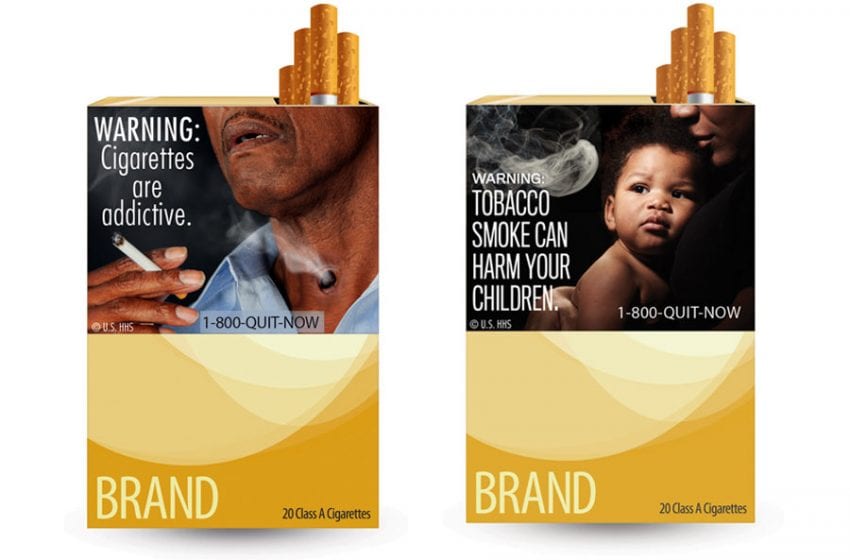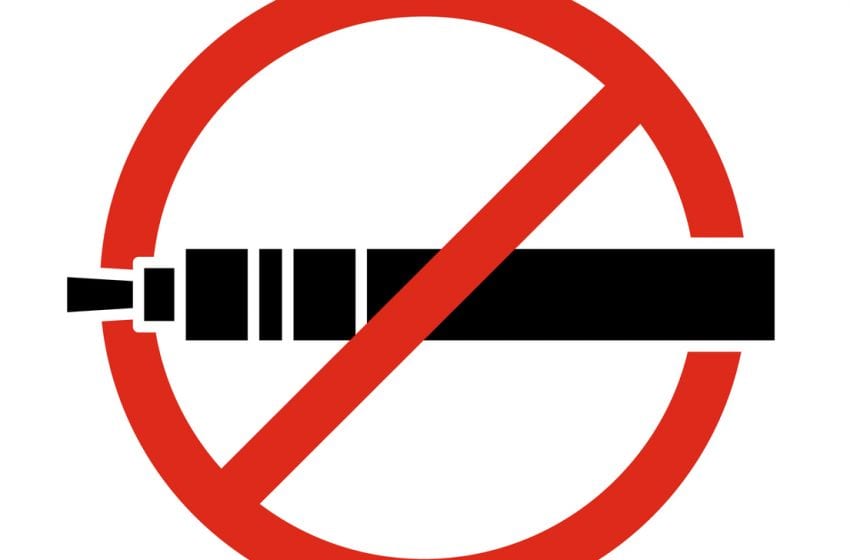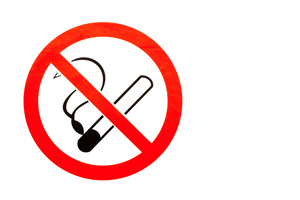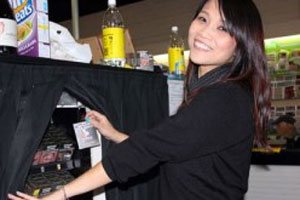All tobacco-product packs sold in Singapore might soon have to carry graphic health warnings enlarged to cover 75 percent of the packaging, according to a Today story.
Currently, graphic health warnings cover 50 percent of the packaging.
In a press statement issued yesterday, the Ministry of Health said it would be conducting a public consultation on its Standardized Packaging Proposal from February 5 to March 16.
In its statement, the ministry said Singapore’s smoking rate had fallen from 23 percent to 19 percent between 1977 and 1984, and then to 12.6 percent in 2004.
But it said the rate of decline had slowed in recent years.
‘The smoking rates have been fluctuating between 12 percent and 14 percent in the last 10 years, with no clear pattern of continuous decline,” said the ministry.
‘A particular concern is the fact that there remains a sizable proportion of men (more than 1 in 5) who smoke daily.’
The ministry said that it is the government’s preliminary assessment that the implementation of the Standardized Packaging Proposal would, with other existing and future tobacco control measures, ‘constitute a significant step towards Singapore becoming a tobacco-free society’.
Members of the public may contribute their views and feedback on the Standardized Packaging Proposal by email at tobacco_control@moh.gov.sg or by post.
The public consultation paper can be found on REACH at www.reach.gov.sg and on ministry’s website at www.moh.gov.sg/proposed-tobacco-control-measures.
Tag: SIngapore

Graphic pack proposal

E-cig ban coming
From February 1, it will be illegal in Singapore to buy, use or possess ’emerging and imitation tobacco products’, according to a story in The Straits Times.
The definition of emerging and imitation tobacco products apparently takes in any device or article that resembles a tobacco product, including vaporisers such as electronic cigarettes, electronic pipes and electronic cigars.
And it takes in too smokeless tobacco products and shisha.
Under amendments to the Tobacco (Control of Advertisements and Sale) Act, anyone caught buying, possessing or using such products can be fined up to S$2,000, the Ministry of Health (MOH) said in a statement today.
Currently, only the importation, sale and distribution of such products are illegal, with those found guilty of such activities liable to be jailed for up to six months and/or fined up to $$10,000. Repeat offenders risk being hit with double those penalties.
In addition, the amended act will gradually raise the minimum legal age for the purchase, use, possession, sale and supply of tobacco products from 18 to 21.
The age limit will be raised from 18 to 19 on January 1; to 20 on January 1, 2020, and to 21 on January 1, 2021.
The ministry of health said it remained committed to lowering the prevalence of smoking in Singapore ‘through a comprehensive, multi-pronged approach.
This approach included imposing restrictions on tobacco advertising and promotions, offering smoking cessation services, using fiscal policies such as taxes, and providing public education on the harms of tobacco use.
No more mister nice guy
Tobacco smoking is prohibited in more than 32,000 premises and locations in Singapore, including shopping malls, offices, hospitals, schools, parks, bus stops and common areas of residential buildings, according to a story in the Straits Times.
Singapore’s already extensive smoking bans were added to on October 1 after which smoking was prohibited within five meters of public places, such as the outdoor areas of universities and the compounds of private institutions, with the exception of designated smoking areas.
The new rules banned smoking within a five-meter radius of kindergartens, childcare centres, primary and secondary schools, junior colleges, polytechnics and the campuses of institutes of technical education.
They banned from smoking private-hire car drivers and passengers, and passengers in trishaws and excursion buses.
It was already illegal for trishaw riders and excursion bus drivers to smoke while working.
The Times said that verbal warnings had been given to 772 smokers who lit up near schools and other areas prohibited under the new regulations, but that the crackdown was getting tougher.
The National Environment Agency was said to have taken an advisory approach in the first three months after the new law came into force to allow smokers time to make the transition to the stricter regime.
But that softly-softly approach changed on January 1. People caught smoking in a place where smoking is prohibited now face having to pay penalties.
Singapore out on a limb
New laws due to come into force in Singapore shortly will outlaw electronic cigarettes, making it illegal to use such devices even at home, according to a story in The Straits Times.
Some 18-plus e-cigarette users reportedly told the Times they planned to go back to smoking combustible cigarettes.
Currently, the sale, import and distribution of e-cigarettes are against the law, but there is no law against vapers using e-cigarettes in private places.
But a ban passed in November will make it illegal for people to buy, use and own what were described in the report as ‘imitation tobacco products, such as e-cigarettes, e-cigars and e-pipes’.
The ban is expected to come into force within the next few months.
With the total ban, Singapore will be introducing the toughest stance possible against e-cigarettes, at the same time as neighboring countries are moving towards allowing regulated use of such products.
The Times quoted stories from three regional media outlets.
In January 2017, Malaysia tasked three ministries to regulate e-cigarettes, though the Sultan of Johor has vowed to stamp out vaping in the southern state, according to a Malay Mail Online story.
In Indonesia, only businesses that had been certified by the health ministry and whose products met national standards were allowed to import and sell e-cigarettes, The Jakarta Post reported.
And, according to the Bangkok Post, even Thailand was reconsidering its three-year ban on e-cigarettes.
When the ban was passed in Singapore in November, the Parliamentary Secretary for Health Amrin Amin said the measures were meant to “de-normalize” the use of tobacco products over time and deny youth access to cigarettes. The Health Ministry considers e-cigarettes gateway products to cigarette use.
Singapore issues tickets
About 19,000 tickets were issued in Singapore last year to people caught smoking tobacco in prohibited areas, according to a Channel NewsAsia story quoting a statement yesterday by the Senior Minister of State for the Environment and Water Resources Dr. Amy Khor.
Of the total number of tickets issued, more than 2,600 were handed to people smoking in food establishments.
Replying to a parliamentary question posed by the MP Denise Phua, Khor said her ministry’s long-term goal was to prohibit smoking in all public places, except in designated areas.
“This is to protect non-smokers from the harmful health effects of second-hand tobacco smoke,” she said.
But she pointed out that because smoking was prohibited at more than 32,000 places, it was not possible for the National Environment Agency (NEA) to watch over every location, or to respond immediately to every report of smoking in prohibited places before the smokers had finished their cigarettes.
Therefore, operators and managers of smoke-free premises had a legal duty to stop patrons from smoking, or request patrons to leave if they refused to stop smoking, she said.
“In cases where they do not stop smoking or leave the premises, the operator or manager of the premises can seek assistance from NEA,” she said, before adding that the NEA had taken out 400 enforcement actions against operators and managers of premises who “had not fulfilled their duty under the law”.
She urged all smokers to be considerate when in public places by smoking only in permitted areas.

Smoke-free future possible
Philip Morris Singapore (PMS) said recently that about three million smokers had switched to its IQOS device, according to a story on The Online Citizen, which Wikipedia describes, in part, as a community blogging platform involved in political activism in Singapore.
The company, an affiliate of Philip Morris International said that more than 232,000 smokers converted to IQOS globally in July 2017 alone.
‘The number of smokers who switched to IQOS to date is equivalent to about five times the number of people who smoke in Singapore,’ the story said. ‘This proves that a smoke-free future is a concrete possibility.’
Lawrence Chew, general manager of PMS, was quoted as saying the company’s ambition was that all the people who would otherwise continue smoking switch to scientifically-substantiated smoke-free alternatives as soon as possible.
“But we cannot achieve this mammoth task alone,” he said. “All stakeholders of the industry have a role to play. We are encouraged by the growing number of experts and governments that are taking steps to support the role that science and innovation can have for public health, and hope Singapore will too.”
The story said that, recently, the UK, the US and New Zealand had joined a growing number of countries who recognized the need to review the evidence of the potential benefits of smoke-free products for public health, and announced steps to leverage their potential in their plans for a future without smoke.

Barred from selling tobacco
Twelve retailers in Singapore have had their tobacco retail licenses suspended and one has had its license revoked after they were caught selling cigarettes to people under the age of 18, according to a Today story quoting the Health Sciences Authority (HSA).
Value Supermart, at 301 Serangoon Avenue 2, had its license revoked after it was caught selling cigarettes to a 17-year-old in school uniform.
Under Singapore law, retailers caught selling cigarettes to minors have their tobacco retail license suspended for six months for the first offence and revoked on the second offence.
However, any outlet caught selling tobacco products to people under 18 and wearing school uniform, or those under 12 years of age, have their license revoked even for a first offence.
Meanwhile, 12 other outlets have been suspended from selling tobacco products for six months after they were caught selling cigarettes to minors who were not in school uniform.
All 13 retailers, which were first-time offenders, did not ask for any form of identification when they sold cigarettes to minors, claiming that they were busy or that the minors looked older than they were, the HSA said.
The HSA has suspended the tobacco retail licenses of 53 outlets and revoked those of nine others since 2015.
‘Sellers take the risk of contravening the laws if they assess age by mere physical appearance of the buyer,’ the authority said.

Ready for display ban
Days before a rule banning the display of tobacco products comes into force in Singapore, most – but not all – stores selling cigarettes told Channel NewsAsia they had done what was necessary to ensure they meet regulations.
As part of the new requirements, tobacco products must be out of the public’s view at all times, except during restocking or during a transaction.
Operators of a large proportion of supermarkets and convenience stores said most, if not all, of their outlets had been installed with opaque cabinets to store cigarettes when the regulation came into force on August 1.
But Channel NewsAsia reported also that when it visited provision shops ‘in the heartlands’ on July 25, some were taking a more casual approach, with no designated cabinets in sight.
Dairy Farm, which operates supermarkets such as Giant, Jasons and Cold Storage, and convenience stores, said all its stores had installed grey or white opaque cabinets ahead of the deadline. The cabinets were fitted with auto-close mechanisms.
It said cigarettes were sold at all 7-Eleven stores, and most Cold Storage and Giant outlets.
In addition to installing the cabinets, Dairy Farm said staff had been trained to ensure they were aware of the new rules. “Training and briefing sessions on the new rulings and internal standard operating procedures have been conducted for all staff across all banners to ensure they understand the new rules and to help them to manage customer queries,” a spokesperson told Channel NewsAsia.

Harm reduction opposed
Professor Chia Kee Seng, dean of the National University of Singapore’s Saw Swee Hock School of Public Health has warned against smokers switching to heat-not-burn (HNB) tobacco products, according to a story by Lin Yangchen published by straitstimes.com.
The Times indicated that Chia was not impressed by claims that some HNB products delivered 90 percent fewer toxins than did regular cigarettes.
“Ten per cent of a highly toxic product still makes it highly dangerous. Simply put, there is no safe level of smoking.”
Chia said that HNB products and electronic cigarettes, many of which are banned in Singapore but are bought online, continued to make it difficult to achieve the ultimate aim, which was to “de-normalise smoking”.
Chia champions raising the minimum legal smoking age, something that is being considered by the authorities in Singapore.
Studies had shown that people who did not start smoking before they were 21 years of age were unlikely ever to begin. At the same time, the younger people were when they first started smoking, the more likely they were to become habitual smokers.
Singapore should follow Australia and other countries that required the standardized packaging of cigarettes, Chia added, thereby removing the power of branding to give the perception that smoking was acceptable.
The Times reported that the latest slew of changes to Singapore’s anti-smoking policies had come as the government’s drive to get more people to quit the habit and slowed.
Although the incidence of adult smoking in Singapore fell progressively from 23.0 percent in 1977 to 13.3 percent in 2013, it has been stuck at that level since then.

Record duty-free event
This year’s TFWA Asia Pacific Exhibition & Conference, the 22nd such event to he held, attracted the largest number of visitors ever.
The event was held at the Marina Bay Sands Expo and Convention Centre in Singapore from May 7 to 11.
This year the event saw 3,087 visitors from the duty free and travel retail industry come through its doors, a figure that was up 6.0 percent from the 2,905 who attended the event in 2016, and up 19.1 percent from the 2,591 of 2015.
‘These figures included representatives from 1,220 companies, up by three percent from 1,186 in 2016 and up by 16.9 percent from 1,044 in 2015, a TFWA press note said.
‘There were 1,273 key buyers at this year’s event, an increase of 18 percent from 1,081 in 2016 and up 29.1 percent from the 986 in 2015. Attendees from 301 companies increased by 10.3 percent from the 273 in 2016 and rose 16.2 percent from the 259 in 2015.
‘The exhibition occupied a total of 10,254 square metres, up four percent from 9,817 square metres in 2016.
‘A total of 316 companies exhibited, up two percent from 310 the previous year; 76 of these companies were new exhibitors.’
“We were delighted to see record figures across all key parameters at this year’s TFWA Asia Pacific Exhibition & Conference,” said TFWA president Erik Juul-Mortensen. “If ever we needed it, the event was confirmation of the huge importance of this region to the great industry that is duty free and travel retail.”







